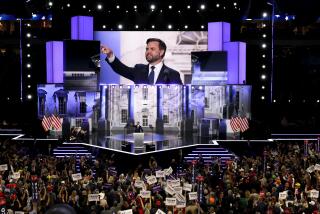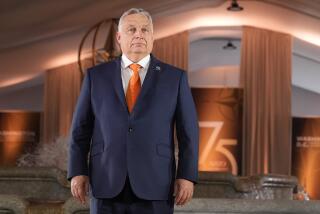Clinton Presents New Side: His Foreign Profile : Politics: Democratic nominee sees Cypriot leader, meets with Nunn and Aspin in bid to bolster stature on world affairs.
- Share via
NEW YORK — Democratic presidential nominee Bill Clinton sought Sunday to cast himself as a world leader and to demonstrate his knowledge of foreign affairs by suggesting alternatives for dealing with the Balkan crisis and by meeting with a foreign leader and influential U.S. military experts.
In a series of campaign-orchestrated events, Clinton and his running mate, Sen. Al Gore of Tennessee, met privately in New York with Cypriot President George Vassiliou. The Democrats then rushed to a closed-door briefing with two of Congress’ leading experts on defense and military affairs: Sen. Sam Nunn (D-Ga.), chairman of the Senate Armed Services Committee, and Rep. Les Aspin (D-Wis.), chairman of the House Armed Services Committee.
And finally, Clinton conducted a news conference, flanked by Nunn, Aspin and five U.S. flags, to receive their praise for being a leader with foresight on world events.
“He was out front, clearly out front” of the White House on the crisis in the former Yugoslavia, Nunn said. “That indicates he is very, very well-qualified in this area and in following events on this . . . despite the rigors of the campaign.”
Both Nunn and Aspin said President Bush’s new harder line on the situation was prompted by Clinton’s recent remarks calling for air strikes against the Serbs to ensure delivery of humanitarian aid.
Bush has bristled at such comparisons, but his own national security adviser, Brent Scowcroft, seemed to confirm them Sunday.
At first, Nunn and Aspin noted, White House spokesman Marlin Fitzwater criticized Clinton’s plan as “reckless.”
“The Administration jumped on his remarks. . . . then four or five days later came right back and has essentially adopted the Clinton policy,” Nunn said. Aspin agreed.
And Scowcroft acknowledged on ABC’s “This Week With David Brinkley” that Bush’s current preference for using air power to support the humanitarian effort in the region does not differ substantially from Clinton’s suggestion.
Clinton’s daylong effort to raise his stature from that of small-state governor to U.S. commander in chief began before he left Arkansas for three days of campaigning.
Approached by reporters as he boarded his plane, Clinton suggested the United States consider lifting the arms embargo to newly independent republics of Bosnia and Croatia if the United States’ European allies refuse to join in military efforts aimed at ending the fighting in the Balkans. France and Britain have been reluctant to get involved, although a compromise under U.N. auspices seemed imminent.
Clinton was careful not to suggest tactical military operations that Bush should take, saying such discussion “would be improper.” But he clearly tried to portray himself as eager and willing to take whatever military actions are necessary.
Clinton told reporters that he was “somewhat concerned” that U.S. allies were not willing to join in military operations. But he said lifting the arms embargo could be an alternative if the United Nations could not agree on concerted action. All parts of the former Yugoslavia are subject to the arms embargo, but Serbian forces have access to the arsenal of the Yugoslav federal army.
“I’m not calling for an end to (the arms embargo),” he said. “(But) I do think it should be reconsidered.”
A similar proposal is being discussed in the Senate Foreign Relations Committee and will come up for debate Tuesday, Nunn said.
Clinton reiterated his position that U.S. air power should be used only to ensure the safety of U.N. relief workers and, possibly, to force the Serbs to allow their prison camps to be inspected, in light of allegations of torture and mass murder.
“I want to be very clear,” he said. “The comments I have made about the use of force to date are confined to the two issues which the United States government is confronting today, which is opening those camps and protecting the relief effort.”
Clinton took issue with Bush’s contention that the White House has been the victim of “political sniping” over the Balkans.
“He couldn’t possibly be talking about me, because all I tried to do is take responsible positions,” he said. “The only political sniping that’s occurred on Yugoslavia is that which was done by his press secretary, Marlin Fitzwater, who called my position ‘reckless.’ I don’t want any politics in the Yugoslavian issue. I just want us to do what we can to try to put an end to those (prison) camps and to protect the relief effort.”
Clinton and Gore will appear together today on the CBS program “This Morning” fielding questions from audiences in several U.S. cities, including Los Angeles.
More to Read
Get the L.A. Times Politics newsletter
Deeply reported insights into legislation, politics and policy from Sacramento, Washington and beyond. In your inbox twice per week.
You may occasionally receive promotional content from the Los Angeles Times.










